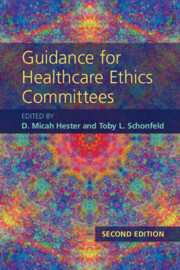Book contents
- Guidance for Healthcare Ethics Committees
- Guidance for Healthcare Ethics Committees
- Copyright page
- Dedication
- Contents
- Contributors
- Preface
- Section 1 The Context of Healthcare Ethics Committee Work
- Chapter 1 Introduction
- Chapter 2 Brief Introduction to Ethics and Ethical Theory
- Chapter 3 Healthcare Ethics Committees and the Law
- Chapter 4 Understanding and Addressing Health Disparities through a Racial Paradigm
- Chapter 5 Cultural and Religious Issues in Health Care
- Chapter 6 Moral Distress
- Section 2 Consultation
- Section 3 Policy Development and Organizational Issues
- Index
- References
Chapter 4 - Understanding and Addressing Health Disparities through a Racial Paradigm
from Section 1 - The Context of Healthcare Ethics Committee Work
Published online by Cambridge University Press: 17 February 2022
- Guidance for Healthcare Ethics Committees
- Guidance for Healthcare Ethics Committees
- Copyright page
- Dedication
- Contents
- Contributors
- Preface
- Section 1 The Context of Healthcare Ethics Committee Work
- Chapter 1 Introduction
- Chapter 2 Brief Introduction to Ethics and Ethical Theory
- Chapter 3 Healthcare Ethics Committees and the Law
- Chapter 4 Understanding and Addressing Health Disparities through a Racial Paradigm
- Chapter 5 Cultural and Religious Issues in Health Care
- Chapter 6 Moral Distress
- Section 2 Consultation
- Section 3 Policy Development and Organizational Issues
- Index
- References
Summary
Bioethics was founded on issues of justice over 50 years ago during the civil rights era. Its founding was in response not only to increasing technological advances, life-sustaining treatments in medicine, and physician paternalism, but also to the exploitation of vulnerable communities in research such as the commonly cited United States Public Health Service study on Black men in Tuskegee, Alabama and the New York School of Medicine hepatitis study on institutionalized children with disabilities at Willowbrook State School. Over the last few decades, the focus on justice in bioethics has faded in the shadow of emerging technologies. In clinical ethics, the primary focus has been on autonomous decision making and beneficent health care. Justice through the lens of health disparities has typically been addressed through public health, not bioethics, but this is changing. The American Society of Bioethics and Humanities’ code of ethics states that HEC consultants should work with other healthcare professionals to reduce disparities, discrimination, and inequities when providing consultations (ASBH, 2014).
- Type
- Chapter
- Information
- Guidance for Healthcare Ethics Committees , pp. 30 - 38Publisher: Cambridge University PressPrint publication year: 2022



